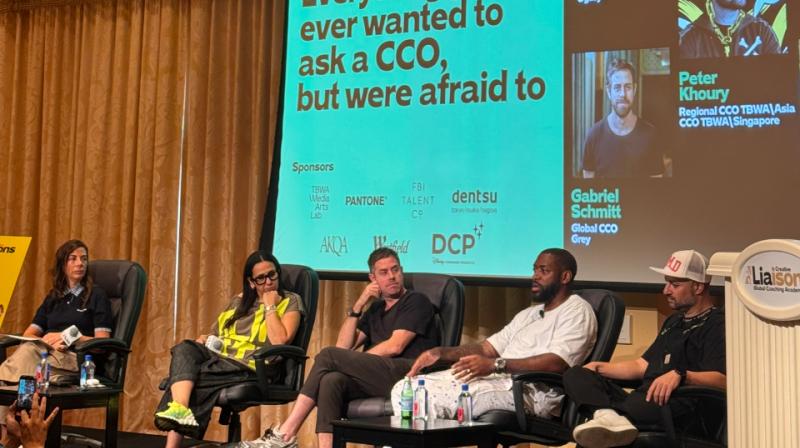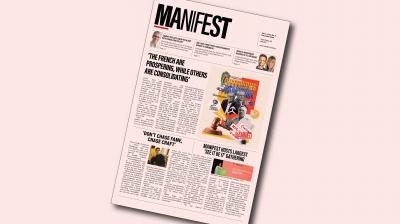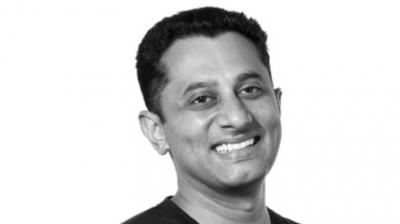Day one of the 2025 edition of the London International Awards’ (LIA) Creative Liaisons program kicked off with a talk featuring Chaka Shobani, president and global CCO, DDB Worldwide; Liz Taylor, global chief creative officer, Ogilvy; Gabriel Schmitt, Global CCO, Grey; Perry Fair, head of creativity, Mattel and Peter Khoury, regional CCO, TBWA\ Asia and CCO, TBWA\ Singapore.
The talk featured questions from attendees of the LIA Creative Liaisons.
The first question the CCOs answered was around the biggest misconception that comes with the title.
Sobhani stated how it could oscillate between two answers, both of which could be considered true. She explained, “Some think that a CCO has control over a lot of stuff, which is both true and false. Then, some people believe that certain CCOs don’t do anything. This is also true and false. This is not because of who they are and the fact that they don’t want to do anything, but it’s because they get dragged into ‘everything’ – some of which isn’t exciting. One should become a CCO for pay check or the go, but because one has the opportunity to create opportunities for so many people or create things for people within the agency as well as clients.”
Schmitt stated that CCOs have a dual life.
“When I was not a CCO, I looked at my bosses, and there were two things that I saw. One was, their life was good and fancy. But at the same time, their life was shit, and people were chasing them around all the time. Both aspects are true – their life is fancy and shit. More the second, that the first though,” he said.
He added, “A CCO is responsible for everything, but controls nothing. On the other hand, I believe creativity can shape the economy. We have a great opportunity to make money all around and create opportunities too. And that’s wonderful.”
Fair added that the biggest change he saw in his life after becoming a CCO was the number of meetings.
“My office was full of toys that I wanted to put together, but I spent every hour in office in meetings. It’s important to have an amazing group of people in your team. Being a CCO means you should have trust in your teams so that they can bring the business to life and make those meetings easier. When I wasn’t CCO, I never understood that CCOs always had people around them and meetings all day. That’s me now. Some of them are fun and some aren’t,” he said.
Khoury added, “No one is born as a leader. One grows into it. I wanted to be a creative when I joined advertising. Now, as a CCO, I have to use both sides of my brain. I have to think of exciting stuff, but also the delegating bit. It’s something everyone in this room can become if there’s enough belief.”
Giving her point of view on the topic, Taylor said, “When I was ECD, I thought the CCO made the work better. That was my biggest awakening when I became a CCO. I had an amazing mentor when I was ECD. I remember the first three months of being CCO – I didn’t realise I had to meet HR to handle talent etc. It’s an incredible job that one gets to set the environment for everyone. And one gets to change people’s lives. We can help people rise.”
The next question the panel answered was: A singular word to describe the work that comes from your agency?
Taylor: Iconic.
Khoury: Disruptive.
Fair: Cultural.
Schmitt: Famous
Sobhani: Emotional
Red flags while reviewing portfolios
The panel discussed potential ‘red flags’ in portfolios.
Schmitt stated that while he doesn’t have ‘red flags’, he does look for a few things in portfolios.
“It depends on the seniority, but if I’m looking at someone in their early stages of their career, I look for people looking to try to flex most of their muscles with work coming from different angles. As one grows in their career, I see how useful one is,” he explained.
Sobhani revealed that she looks for passion. “I get bored by seeing ideas. I’ve been in advertising for only 11 years, and it’s been a ride. If I could learn advertising, anyone can. I want to see what one’s passion is. Being interesting and interested is also something I look for.”
Khoury stated, “The one thing one can’t teach anyone is self-motivation. I look for that more. Self-motivated people will learn a lot and won’t be lazy. That’s the biggest thing for me.”
Taylor added, “I love quality over quantity. It’s about taking on the art and not just doing the easy. I also like ‘the holy f*** I wish I did that’ idea. I like being surprised.”
The panel then shared an underrated skill or trait that they look for in young creatives.
Khoury stated the importance of being T-shaped. “One should be good at doing one or two things but able to do a lot more things.”
Schmitt spoke about the importance of relationships.
“I had to nurture some ideas and sell some to clients when I became ACD. It’s about creating relationships with peers. Be friends with account people, for instance. Do not stay confined to your craft. Look at how things can be made better.”
Taking off from Schmitt’s point about relationships, Fair added, “At Mattel, the CCO is the chief commercial officer too. So I’m the client, and I’ve also dealt with CCOs at agencies. I manage around 60 external agencies. The amount of relationship building that one has to have is insane. I look for the ability to build relationships. This will take one so much further on in life than just being a creative. Make your clients your trusted partner.”
Sobhani had a piece of advice for the young women creative Liaisons.
“It’s not exclusive to the girls, but slightly more pointed towards them, because we live in a patriarchal world. The most important thing I ask young creatives is to find their voice and f****** speak up for them. There will be people with louder voices and who will speak over you, but stand up for who you are. For boys, too, you’ll be in such situations, but find your voice,” she said.
Do CCOs crack under pressure?
The CCOs then discussed managing and cracking under pressure.
Sobhani said, “We are CCOs and also humans. We have responsibilities too – lives, children, mortgages. Sometimes, we need to say it’s only advertising and calm the f*** down. My vulnerability is my great strength. One needs to keep shit together to keep things going. My mentor is part of my contract. I have networks and relationships that are important. I talk to people from Mother (an agency she had worked with in the past), or when I was working in TV.”
Khoury stated, “I swim to calm myself down. It’s like meditation. One needs to find balance in life because advertising doesn’t have it. Find time for oneself – whether it’s exercise or meditation, as that will have a positive effect on your job.”
Schmitt took off from Sobhani’s point of view about relationships.
“People who live longer keep their social lives active. People crack under pressure and that’s the nature of the job. But one has to keep their cool. If you crack in front of people, people will crack with you. Foster relationships, and as you grow, don’t stop talking to each other.”
Has someone told you you’re being too emotional?
Sobhani stated that if she was told she was being too emotional, she’d tell the person to f*** off.
She explained, “But it depends on what a person is doing. I would ask what the meaning of being too emotional is. If one is making one person feel uncomfortable, I’d ask why.”
Khoury added, “It’s all about the work and making it better. If one gets emotional and makes things better, then one should get emotional.”
Fair stated how creativity is all about emotions.
“Creativity is an emotion in itself. Laughter and crying are also emotions. Creativity needs emotions. I’ve written scripts and cried while reading them cause I’m so involved in them. Don’t leave your emotion at the door, it’s your super weapon.”
Taylor ended the talk by stating, “I’ve been told I’m too emotional or I’m talking too much about my children. Someone might want to gaslight you at that moment. Respond to them in your way. One will be told crappy things. I’d say, be so good that they can’t ignore you.”

.jpg)









